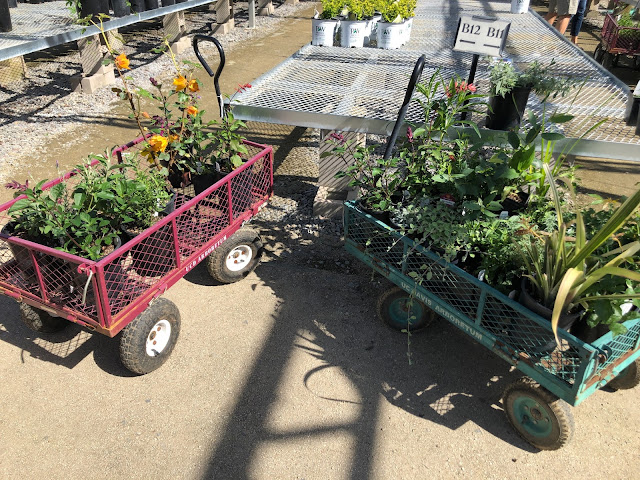
|
|
At a plant sale, at the UC Davis Arboretum or elsewhere, it's sooo easy to load up the cart with cool-looking plants. Resolve to buy from a plan so your purchases don't
languish in their pots for lack of planting. (Photo: Kathy Morrison)
|
Start with a calendar and taking notes
Happy New Year! We (and our gardens) survived another 12 months. But what can we do to make 2020 better?
As we open our new calendar, it’s that time when we again take stock of ourselves and our habits, vowing to change. As gardeners, some simple resolutions will make our overall tasks much easier – and help our plants thrive.
1. Get a calendar and use it. Not just to keep track of dates, but when certain tasks such as fertilization, spraying and pruning should be done. You may think you can remember when you did or should do things, but putting them in writing allows you to see progress at a glance. Use that calendar to make notations when you planted seeds, fed your tomatoes and other tasks. As a bonus, master gardener calendars include those reminders each month.
2. Fertilize in time. Your plants need certain important nutrients at critical steps in their development. Giving your tomatoes loads of nitrogen may be helpful when first transplanted in April, but produces nothing but vine in mid-summer. Roses, for example, respond to monthly feeding during their bloom periods (make notes on that calendar). Figure out in advance when you should feed your garden and mark it on your calendar.
3. Don't overwater. OK, it looks like it’s going to be a good water year (knock on wood), but water saving is always a good idea. Too much water still does more harm than good, promoting rot and fungal disease.
4. Don't buy plants without a plan. (That goes for seeds, too.) I have dozens of seed packets that looked so enticing in the catalog or store, but never got planted – there wasn’t enough time or space! How many pretty plants have to die in their pots without being transplanted for me to learn this lesson?
5. Clean and sharpen tools regularly! Good tools make jobs go faster. (That’s a major lesson during pruning season.) Treat tools well and they’ll last for years.
6. Keep track of what you planted and where. Draw a garden map, label major plants with permanent markers, make notes on that calendar – whatever works for you. Months (or years) from now when you need to know a variety (yes, it’s a rose, but which one?), you’ll have the answer handy. This is also important when planting bulbs or perennials that tend to “disappear” before resurfacing.
7. Remember to have fun. Gardening shouldn’t be all work. The more time we spend enjoying our gardens, the more rewarding they will be.
